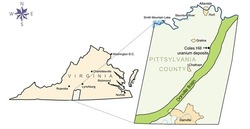A critical look at plans for uranium mining in Virginia
 Virginia Energy Resources -- a company formed by last year's merger of Canadian corporation Santoy and Virginia Uranium -- wants to mine and mill uranium on 3,000 acres in Southside Virginia's Pittsylvania County along the North Carolina border.
Virginia Energy Resources -- a company formed by last year's merger of Canadian corporation Santoy and Virginia Uranium -- wants to mine and mill uranium on 3,000 acres in Southside Virginia's Pittsylvania County along the North Carolina border.That would require lifting a ban the state placed on uranium mining back in 1982. The Virginia Commission on Coal and Energy created a subcommittee to study the issue, which is scheduled to be released later this year. Meanwhile, the National Academies of Sciences and Virginia Tech have also agreed to study the potential environmental and public health impacts of the mining plans; that study is expected to be released next year.
The push to open up the state to uranium mining comes as President Obama is promoting the expanded use of commercial nuclear power in the United States. His latest budget would triple taxpayer-backed loan guarantees for new reactors from $18.5 billion to $54 billion.
The Virginia uranium deposit holds an estimated 60,000 tons -- enough radioactive fuel to power all the commercial nuclear plants in the U.S. for about two years.
Last week, the Southern Environmental Law Center, Sierra Club and other groups opposed to uranium mining held a forum in Richmond to discuss the drawbacks associated with the plans. Here in the United States, uranium has traditionally been mined in arid regions of the West; if the Virginia mining plans were approved, they would mark the first time that full-scale uranium mining was done in the wetter climes east of the Mississippi River.
A major concern is the impact that uranium mining and milling -- a highly toxic undertaking -- would have on the Roanoke River basin, where the uranium deposit is located. That basin supplies drinking water to tens of thousands of people across a vast region stretching all the way to the tourist community of Virginia Beach and the naval base at Norfolk.
The company says the uranium could be mined safety. However, uranium mining has a well-documented history of causing serious environmental health problems elsewhere, having been linked to chromosome abnormalities, birth defects and cancer in communities from Texas to Germany.
As the debate over the Virginia uranium mining plans continues, the Southern Environmental Law Center has released a short video taking a critical look at the proposal. Watch it here:
Tags
Sue Sturgis
Sue is the former editorial director of Facing South and the Institute for Southern Studies.
